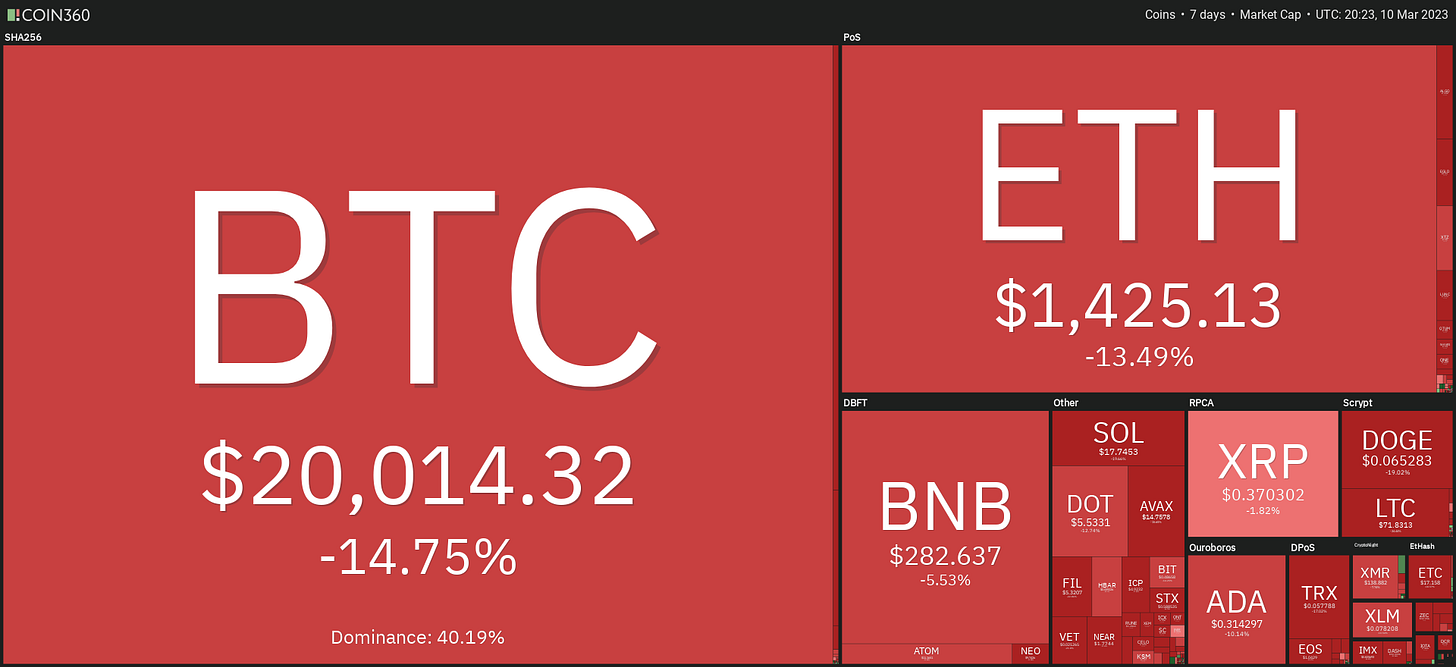📔 Weekly Journal: Updates Galore 🎆
[7 min read] In your inbox every Saturday, best enjoyed with coffee and lunch ☕🍽️. Today is jam packed with juicy updates on Amazon NFTs, GPT4 coming next week, and Apples mixed reality headset

This week’s Weekly Journal 📔 has a new look. There are a heap of exciting updates in the emerging tech and metaverse space, hope you all enjoy them.
New subscribers are encouraged to check out the history & purpose of this newsletter as well as the archive.
Enjoy your weekend! 😎
Ryan
Here’s what you’re getting today:
Market update: Bitcoin holds $20k despite two major negative news stories
Interesting news: Updates on Amazon NFTs, GPT4, and Apples mixed reality headset
Video of the week: Deep dive into “Apple Reality Pro” [name pending!]
This week’s AI creation: I explore using ChatGPT to create balanced arguments
Market update 📉
📉 Crypto market has suffered this week and Bitcoin has dropped to support levels at $20k. There seem to be three big reasons:
New York State Attorney General Letitia James has sued Seychelles-based crypto exchange KuCoin, alleging that the platform is violating securities laws by offering tokens, including Ethereum, without registering with the attorney general’s office. The suit claims that Ethereum is considered a security under the Martin Act, a 102-year-old New York anti-fraud law. This is the first time that a regulator has claimed in court that Ethereum is a security, this is a big deal. The attorney general is seeking a court order to prevent KuCoin from operating in New York and from representing itself as an exchange.
Concerns over the failure of Silicon Valley Bank and Silvergate Bank. These fears have led to a bank run on USDC, as traders are concerned that Circle, the issuer of USDC, held a significant amount of the reserves backing USDC in these failed banks. This has also had a ripple effect in DeFi, and has caused broader market instability, with the S&P 500 falling 4.4% on the week.
MT. Gox, a Tokyo-based Bitcoin exchange that handled over 70% of all Bitcoin transactions worldwide before ceasing operations in 2014 due to alleged mismanagement, fraud, and theft, is set to begin payouts to creditors on March 10. With nearly 140,000 BTC worth over $3 billion in its cold wallet, there are concerns that the possible selloff of newly-received Bitcoin by creditors could tank BTC prices. However, it seems that the recipient of 90% of the BTC has no plans to sell.
🗺️ Crypto Market Heatmap shows a rough week with the above news (size of the blocks are market share, colour & % show the change over the last week)
🤔 Sentiment levels are reflective of human emotions (over)reaction to market news. Naturally, we are back in Fear territory. Great to see the total market cap hold over the $1.5 trillion mark (Somewhere between Google & Microsoft, way above Silver)
Interesting news from the week 🗞️
🎲 Updates to Amazon NFT story, they are set to launch their own gamified NFT marketplace in a matter of weeks with the launch delayed twice following FTX's collapse. The platform will initially be available to US customers only, offering 15 collections of digital collectables that are linked to physical goods like clothing. Customers will be able to buy the NFTs with their Amazon account using debit or credit cards, with no support for crypto payments initially. The move comes as the NFT market shows signs of recovery, with $2 bn worth of NFTs traded in February.
🦾Updates to ChatGPT with Microsoft Germany announcing yesterday that GPT-4, with multimodal capabilities that include generating videos, will be introduced next week! The AI technology will offer new possibilities, such as allowing users to interact through text, images, and sounds. GPT-4 will also generate answers faster than GPT-3.5 and create responses that are more human-like. These changes will also be available in Bing Chat in the near future - no wonder Google is scared.
🍎 Updates to Apple's much-anticipated mixed reality headset launch, which is expected by the end of 2023, according to prominent leaker Mark Gurman. Apple has reportedly been working on the product for over seven years and will likely be the first new product category since the Apple Watch in 2015. This is big because the true Metaverse as I see it will require extended reality hardware that is accessible to the masses. This will provide a fully immersive experience, allowing individuals to interact with each other and the environment in a more natural and intuitive way, leading to increased engagement and adoption. More details are in the video below.
Video of the week 🎥
The headset may be called Apple Reality Pro, is expected to feature internal and external displays, with two micro-OLED displays made by Sony, each with 4K resolution. The device will also have a built-in camera, more than a dozen cameras for pupil movement and facial expressions, and LIDAR scanners. It is likely to be powered by Apple's M2 processor and a chip called Bora, with a battery worn on the hip.
This 5 min video has the latest on anticipated specs, operating system, price, and release date, complete with exclusive renders.
This week’s AI creation 🎨🤖🎵
Each week I showcase something amazing generated by an AI-based tool. AI is disruptive, challenging industries and driving innovation. My vision of the emerging Metaverse predicts the use of many AI tools to enhance how we work, learn, play and socialise.
I get lots of questions and concerns about the dangers of AI. While self-learning, machine-based super-intelligence is a legitimate concern, large language models like ChatGPT (Microsoft) and Bard (Google) simply are not this. If anything, the concern should be what humans do with these tools (fantastic read on this here: https://arstechnica.com/gadgets/2023/02/dont-worry-about-ai-breaking-out-of-its-box-worry-about-us-breaking-in/) Generative AI uses a large sample text of data to analyse, synthesis, and regurgitate information. Just like a google search, but one that mashes up the results into an answer. Do you trust all the text on the web? I don’t, but it’s a starting point for most people when researching something but you need to fact-check it.
ChatGPT is excellent for the research process, to shortcut the data search and give you a headstart on synthesising. It should be trusted as much as the source of information - millions of web pages and text.
It took me a few tries, early attempts gave great references…that didn’t exist. I found asking for links helped. This ended up being the best prompt:
This is the result, not bad. Its a certainly a good starting point to dive deeper.
Introduction:
Universal Basic Income (UBI) is a policy proposal that has gained attention in recent years. It involves giving a regular cash payment to every citizen, regardless of their income or employment status. The idea is to provide a safety net for individuals who may be struggling to make ends meet. However, there is much debate about the effectiveness and feasibility of UBI as a policy solution.
Arguments for Universal Basic Income:
Reducing poverty and inequality: UBI has the potential to reduce poverty and inequality by providing a basic level of income for all citizens. Studies have shown that UBI can significantly reduce poverty rates and improve the overall well-being of individuals (Haagh, 2020).
Supporting job transitions: UBI can also support individuals during job transitions, such as when they are between jobs or seeking education or training. With a basic level of income guaranteed, individuals may be more willing to take risks and pursue new opportunities (Widerquist & Howard, 2018).
Boosting local economies: By providing a basic level of income to all citizens, UBI can stimulate local economies. People will have more money to spend, which can lead to increased economic activity and job creation (Strelitz & Osberg, 2021).
Arguments against Universal Basic Income:
Cost: One of the main criticisms of UBI is its cost. Providing a basic income to all citizens would require significant financial resources. Some estimates suggest that the cost of implementing UBI would be prohibitively high (Moffitt, 2019).
Disincentivizing work: Critics argue that UBI could disincentivize work, as individuals may be less motivated to seek employment if they receive a basic income regardless of their work status. This could lead to a reduction in economic productivity and growth (Cochrane, 2020).
Equity concerns: There are also concerns about the equity of UBI. Critics argue that providing a basic income to all citizens, regardless of their income or wealth, is not fair. They argue that resources should be targeted towards those who are most in need (Raventós & Wark, 2018).
Conclusion:
In conclusion, there are compelling arguments for and against Universal Basic Income. Proponents argue that it can reduce poverty and inequality, support job transitions, and boost local economies. However, critics raise concerns about the cost, disincentivization of work, and equity concerns. Ultimately, the effectiveness and feasibility of UBI as a policy solution will depend on a range of factors, including the specific design of the program and the economic and social context in which it is implemented.
References:
Universal Basic Income and Work Incentives. National Bureau of Economic Research. https://www.nber.org/papers/w27712
Basic Income as Common Dividends: Piloting a Transformative Policy. Policy Press. https://www.progressiveeconomyforum.com/8915901745
Universal Basic Income in the US and Advanced Countries. National Bureau of Economic https://www.nber.org/papers/w25538
Thats all for this week! If you have any organisations in mind that could benefit from learning about emerging technology, be sure to reach out. Educational workshops are one of many consulting services I offer.



